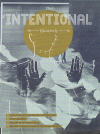The Intentional – Fall 2013
The Intentional is a new magazine that aims to “capture the twenty-something experience and explore innovations that might augment quality of life for millennials.” After reading Kate Jenkins’s editor note in the first issue, I, as a twenty-something myself, knew that this would be a magazine worth reading, and I was right; I read this second issue cover to cover, start to finish, all in one sitting.
The Intentional is a new magazine that aims to “capture the twenty-something experience and explore innovations that might augment quality of life for millennials.” After reading Kate Jenkins’s editor note in the first issue, I, as a twenty-something myself, knew that this would be a magazine worth reading, and I was right; I read this second issue cover to cover, start to finish, all in one sitting.
Margaret Herre’s “The Applicant” jabs and pokes fun at the application process as a few years after deciding to pursue art, she ends up applying for medical school:
I’ve been spending a lot of time sending messages and hoping for an invitation from schools to meet up and commit. I even accidentally called my OkCupid profile my “application” once—an uncomfortable amount of soul-baring is required for both in order to be attractive.
And so she goes on to give us sample application questions with sample answers, trying to garner that attention. Take, for example, her response to “discuss a challenge you have faced”: finding an apartment in New York City. “I prevailed in the face of real estate adversity,” she writes, “and now you and I are neighbors—so I think it would be really fucking rude if you didn’t accept me.” Cleverly and wittingly displayed, this essay asks questions of how far we will go and how much of ourselves we will show in order to be accepted.
The stand-out in this issue was the collection of essays about ethical travel. Andrew Crosson introduces this section by discussing how when we travel to a new place, we must really immerse ourselves in the culture and stop seeing it as just a paradise destination. The people that live and work in those vacation spots are serving the others on vacation. “There is no guarantee that venturing abroad will produce a connection [with the local people],” Crosson writes, “but as young Westerners we chronically underestimate the ripple effects of our actions and interactions away from home. Realizing this and being thoughtful about how we represent ourselves to others, especially abroad, may be the first and most critical step towards more ethical travel.” Three essays of the writer’s experiences abroad follow to round out this discussion.
Of particular interest to me was David Campell’s “Common Ground” in which he tells his experience of working for an adventure cycling company in Europe. Working as a luxury adventure guide, he experienced people who were fascinated for the first five minutes of a helicopter ride only to be distracted and turning to their iPhones seconds later. He then goes on to work in Senegal for the Peace Corps. And while he was there for so long, he feels he was never fully accepted into the community because, just as all of the other volunteers do, he eventually has to (and does) leave. Now working on his master’s thesis, he anticipates returning to Senegal at which point his host mother will ask what he has been doing:
I’ll search for an explanation that could somehow be meaningful to someone who has never been more than a day’s bus ride from where she was born, but ultimately I’ll hide the full truth out of modesty and shame. I’ll say simply that I’ve been studying. How exactly can I explain that I did so in New Zealand, on the opposite side of a globe whose vastness she cannot comprehend, thus causing that chasm between us to grow?
These ideas stuck with me. When we travel, how do we interact with the culture we enter, and how do we identify with its people?
And I was continually reminded of Colin D. Laursen and Breanna Forni’s “From the Beltway to the Backgrounds” for the next week after reading, as the people surrounding me, like their neighbor, told me how they do not want to discuss politics in the same way that “Tonight Donny doesn’t want to talk about politics, but he does want to tell us that Obama has ‘done wrong’ and that we need someone who can change things.” They don’t want to talk about it, but they would like to gently insert their vague opinion.
And certainly I could go on and on about each individual piece in this issue—each one is worth reading—but I’ll stop here and let you enjoy the rest for yourself. While each individual piece is well written and each page wonderfully illustrated and designed, the collection as a whole is really what strikes me; it is doing what the editors set out for it. It’s a publication that is as important and meaningful to read as it is enjoyable.
[www.theintentional.com/]





